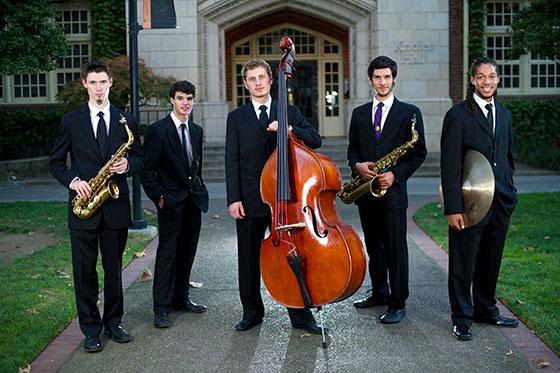
Brubeck Institute's Jazz Quintet
Jazz Appreciation Month: A Tribute to Dave Brubeck
In celebration of Jazz Appreciation Month, the Smithsonian American Art Museum will present a concert in tribute of the late Dave Brubeck by the Brubeck Institute's Jazz Quintet (BIJQ) from the University of the Pacific. Laurel Fehrenbach, public programs coordinator at American Art, spoke with Simon Rowe, Executive Director of the Institute, and pianist Paul Bloom on the legacy of this great jazz legend. Our tribute, Dave Brubeck: Across Time, will take place Monday, April 22, 2013 at 6:30 p.m. A special pre-concert discussion about Brubeck's music and his impact in the world of jazz starts at 5 p.m.
Eye Level: We are so looking forward to celebrating Dave Brubeck during Jazz Appreciation Month. Can you tell us a bit about the Brubeck Institute's history and Dave's involvement?
Simon Rowe: The Brubeck Institute was established in 2000 to build on Dave Brubeck's lifelong dedication to music, creativity, education, and the advancement of important social issues including civil rights, international relations, environmental concerns and social justice. Both Dave and Iola Brubeck and the Brubeck family have been closely involved in the growth of the Institute, performing at and attending annual Brubeck Festivals and supporting the outreach and education programs.
EL:SR: His long career exemplifies the journey of a fearless spirit who embraced many styles of music over a 70 year career and led one of the most famous groups in the history of Jazz music(The Dave Brubeck Quartet). He was a bold spokesman for civil rights and used his position to advocate for positive change with his wife and partner Iola.
Paul Bloom: Dave is truly a role model for all of us. Not only is his music amazing, but he's one of the only a few really selfless musicians. When Dave performed or composed, he was never just doing so for money or for his own personal satisfaction, the way the majority of musicians do. Instead, he used his music as an extremely powerful tool to impact society in a positive way, whether that meant cancelling tour stops at a personal loss when the venues told him they were segregated or taking his band on a tour behind the Iron Curtain during Cold War. His incredible work in using music to benefit others is a gigantic inspiration for all of us to follow in his footsteps.
EL: How will you keep Dave's spirit and legacy alive for these students, now that he has passed?
SR: The first and most obvious way for our students to understand Dave Brubeck is to learn and to play his music. The next is to study his life and career to understand his impact on the world through jazz and the arts.
PB: The best way we can keeps Dave's legacy alive is to continue where he left off, and do the best we can to use the music we love to cause positive change in society. As students, we try to do this by teaching music (especially to those who ordinarily wouldn't have access to the opportunity to learn) playing Dave's music and telling his story to as many people as we can, performing, and setting up benefits and fundraisers for causes we believe in and think we can impact.
EL: Does the BIJQ compose their own music? Where do their influences come from?
PB: Yes. Most of the music we play in the BIJQ is composed by one or more of the members of the band. As a composer, my biggest influence is almost always the group of people that I'm writing for, so in the case of the BIJQ, I'm very influenced by Adam, Rane, Malachi, and Tom. We've all played together so much, and know each other so well that I often come up with songs because I can hear them playing the parts of the songs in my head, even before I or anyone else has actually played those parts. Aside from the guys in the group though, a few of my influences in music right now are Duke Ellington, The Punch Brothers, Debussy, Dr. Seuss, Brad Mehldau, Antonio Carlos Jobim, Ahmad Jamal, Becca Stevens, James Blake, Julian Lage, & The Bad Plus.
EL: As the relatively new leader of the Brubeck Institute, what is your vision for its future? Where do you see it going and what impact would you like it to have on the music world?
SR: Our hope for the institute is that we can continue the impact society through the arts, continuing the life's work of Dave and Iola Brubeck in education, community engagement and as a catalyst for social change.
If you love jazz, visit the museum every third Thursday from 5-8 p.m. for American Art's free Take 5! jazz concerts series in the museum's Kogod Courtyard.

